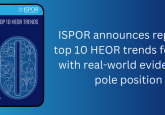HARPER: joint ISPE/ISPOR Task Force publishes new guidance on designing and conducting RWE studies

The HARmonized Protocol Template to Enhance Reproducibility (HARPER) provides a set of core recommendations to enable researchers to develop transparent and reproducible RWE study protocols be used throughout the research process
The International Society for Pharmacoepidemiology (ISPE) and ISPOR—The Professional Society for Health Economics and Outcomes Research have announced the publication of the HARPER template, a new template for RWE studies providing a common text, tabular and visual structure for communicating about study design, analysis, and implementation.
The template, called “Harmonized Protocol Template to Enhance Reproducibility of Hypothesis Evaluating Real-World Evidence Studies on Treatment Effects: A Good Practices Report of a Joint ISPE/ISPOR Task Force,” was jointly published in Value in Health, the official journal of ISPOR, and Pharmacoepidemiology and Drug Safety, the official journal of ISPE. The template is freely available to download in both journals.
With increased focus on RWE to aid regulatory and HTA decisions, the HARPER template was developed in response to the ambiguity in the communication about the design and conduct of RWE studies. Recognising this issue, ISPOR and ISPE convened a joint task force including members from both societies as well as international stakeholder groups including regulatory agencies, HTA organizations, industry, and academia to develop the harmonized template.
“The overarching principle of this effort was to reach for sufficient clarity to achieve 3 main goals,” noted lead author Shirley V. Wang PhD, Brigham and Women’s Hospital, Harvard Medical School. “First, help investigators thoroughly consider and document their choices and rationale for key study parameters that define the causal question. Second, facilitate decision making by enabling reviewers to readily assess potential for biases related to these choices. And third, facilitate reproducibility.”
The HARPER template provides a set of core recommendations for clear and reproducible RWE study protocols and is intended to be used by researchers as a foundation throughout the study process from development of a valid study protocol to registration, implementation and reporting on those implementation decisions.
The joint task force recognises that in order for the template to be used as it is intended, education and piloting of the template with key stakeholders such as regulatory agencies and HTA groups will be needed.
The authors comment “Going forward, we recognize that RWD analytics is a rapidly evolving field and that this work may need iterative revision. Therefore, we plan to have the harmonized template reviewed and updated as needed through a standing review process.”
Want regular updates on the latest real-world evidence news straight to your inbox? Become a member on The Evidence Base® today>>>






